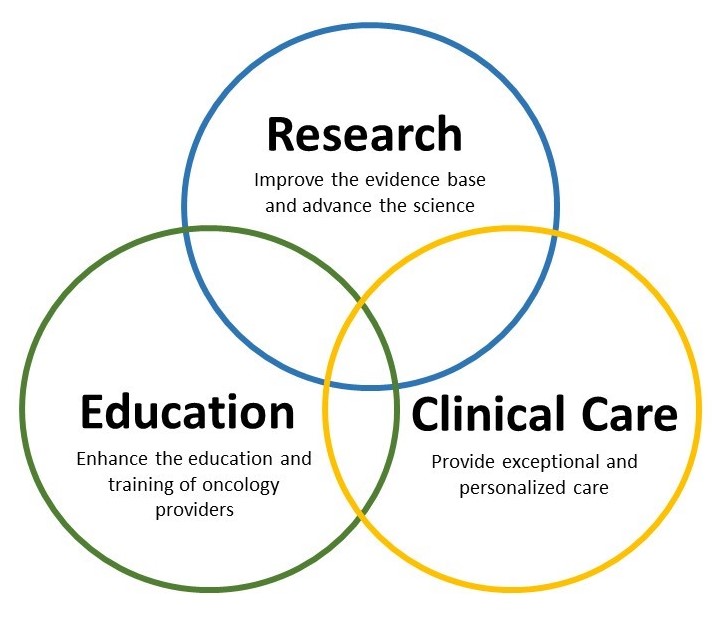Age is the greatest risk factor for cancer development and the US population is aging with a projected doubling in the number of patients 65 and older by 2030. The primary mission of the Cancer & Aging Program is to improve the care and outcomes of the growing number of older adults with cancer. This mission is achieved through a combination of innovative research, enhanced education, and personalized clinical care.
 One of the primary aims of the program is to advance the knowledge in the field of cancer and agingresearch. Chronological age alone and performance status is insufficient in gauging the heterogeneous aging process, and we strive to develop additional tools to “stage the aging” and assist both patients and physicians in evaluating the risk/benefit of treatment decisions. In patients that are at-risk for adverse outcomes, we are developing and testing interventions to improve outcomes. Although the majority of cancer diagnoses occur in older adults, they continue to be inadequately represented in traditional clinical trials and there is inadequate data to drive many of the treatment decisions and management of older adults with cancer. Through unique use of secondary data sources and the development of our own older adult cancer registry, we are filling these key knowledge gaps across the cancer spectrum from diagnosis through cancer survivorship and palliative care. The Cancer & Aging Resilience Evaluation (CARE) Registry is an ongoing prospective registry of older adults (age ≥60) diagnosed with cancer that CARE survey at the time of initial consultation. With over 1,500 older patients enrolled to date, this represents one of the largest prospective registries of geriatric assessment data within the United States.
One of the primary aims of the program is to advance the knowledge in the field of cancer and agingresearch. Chronological age alone and performance status is insufficient in gauging the heterogeneous aging process, and we strive to develop additional tools to “stage the aging” and assist both patients and physicians in evaluating the risk/benefit of treatment decisions. In patients that are at-risk for adverse outcomes, we are developing and testing interventions to improve outcomes. Although the majority of cancer diagnoses occur in older adults, they continue to be inadequately represented in traditional clinical trials and there is inadequate data to drive many of the treatment decisions and management of older adults with cancer. Through unique use of secondary data sources and the development of our own older adult cancer registry, we are filling these key knowledge gaps across the cancer spectrum from diagnosis through cancer survivorship and palliative care. The Cancer & Aging Resilience Evaluation (CARE) Registry is an ongoing prospective registry of older adults (age ≥60) diagnosed with cancer that CARE survey at the time of initial consultation. With over 1,500 older patients enrolled to date, this represents one of the largest prospective registries of geriatric assessment data within the United States.
 As there are too few geriatricians to assist in the management of the surging number of older adults that develop cancer, we strive to educate the oncology workforce about aging-related concerns and useful tools in the management of older adults with cancer. Through didactic lectures, clinical rotations, quarterly presentations, and an annual symposium, we provide continuing education on the management of older adults with cancer. In addition, members of the program present research findings in regional, national, and international conferences and mentor young investigators and students in career development and research.
As there are too few geriatricians to assist in the management of the surging number of older adults that develop cancer, we strive to educate the oncology workforce about aging-related concerns and useful tools in the management of older adults with cancer. Through didactic lectures, clinical rotations, quarterly presentations, and an annual symposium, we provide continuing education on the management of older adults with cancer. In addition, members of the program present research findings in regional, national, and international conferences and mentor young investigators and students in career development and research.
Lastly, as part of the Cancer & Aging Program, we ultimately aim to assist in the clinical management of older adults with cancer in the state of Alabama. Besides intergrating the CARE survey as a part of routine care at UAB, we are also working to develop a multidisciplinary consultative geriatrics clinic, entitled the Cancer and Aging REsiliency (CARE) clinic that includes a geriatrician, nutritionist, pharmacist, social worker, and rehabilitation specialist that is designed to address the complex and unique needs of vulnerable older adults with cancer. The CARE clinic provides a comprehensive aging assessment to assist in evaluating age-related aspects of clinical care and provides a personalized plan to address all aspects of the older adult’s health. The CARE team will coordinate care with each patients’ primary oncologist, surgeon, and/or radiation oncologist.